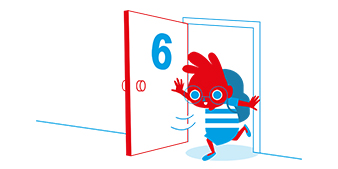April, 2017
"Wriggling in seat during homework time is attributed to disorder; sitting stock-still for video games is not a problem - what kind of AD/HD is this?" This is said to be the reason that has infuriated a lot of parents, who consider their children naughty because they are able but reluctant to sit still. How is attention deficit/ hyperactivity disorder (AD/HD) diagnosed? How can we understand children's reluctance to sit still and, subsequently, how can such understanding help?
As the expert says...
Rex Wong Chun-kit, Educational Psychologist of Heep Hong Society, highlights that occasional sitting still does not mean a proof of no AD/HD and assessment should not be based on their performance at playtime alone. In fact, closer observation can reveal that AD/HD children find it more difficult to concentrate than children of the same age even during playtime. However, it is slightly different in the case of video games from that of ordinary games, because the former's on-going changes pose vigorous stimuli to concentration.
As Rex Wong explains, the assessment of AD/HD comprises three areas including clinical trials by doctors or psychologists and observations from school and home. Diagnosis is based on a clear set of criteria. Apart from restlessness, other symptoms include inattention, impulsivity, and over-talkativeness. These symptoms must be observed in two or more settings (particularly at home and school) and have persisted for at least six consecutive months, exclusive of any adaptation issues due to unusual circumstances.
"We can hardly expect children to stay in their seats for long when they are first admitted to primary school. Inattention tends to improve gradually over time. The diagnosis can only be confirmed when teachers of different subjects share the same observation that the child is always fidgeting while seated and can't help leaving his/her seat."
Different activities solicit different levels of attention. Interesting ones are thrilling and engaging whereas recitation is distressing – but doesn't everyone feel the same? Rex Wong says that AD/HD children demonstrate such reactions more vividly. Adults can help by adjusting their children's ways of learning accordingly.
"Preparation for dictation, for instance, can start and span over a few days beforehand. Each session should complete in fifteen minutes so that children can see the outcome more quickly and are more likely to be reinforced by immediate success."
"At school, most teachers incline to place AD/HD children on the front row for easier care-taking. Teachers will check if the children can grasp the lesson content through activities and questions every once in a while. Students in senior primary grades are taught how to jot notes during class and focus with the help of images because visual cues can help children with self-regulation." Different methods suit the needs of different children. One important reminder for adults from Rex Wong: telling is not the only way to remind your children, neither is punishment.
"Punishment alone leads children to feel not being understood by their parents and teachers. To strengthen our relationships, we need these children to know that adults are trying to help them with various ways. Parents need to adjust their expectation and plan solutions together with kids. Adults need to believe that children also want to better themselves as they grow older."
In regard to drug use for treating AD/HD, Rex Wong concludes from the current medical research that the most effective way is still the combination of drugs and behavioural therapy, though every case is unique and needs diagnosis by doctor. Parents and teachers must understand that no drug is a panacea and it must be paired up with adaptive teaching strategies. According to recent news reports, some parents mistake medication for AD/HD as a "smart drug" and request prescription for their children who are not diagnosed. Rex Wong regards such move as unwise, "I am shocked by such short-sightedness. Drug use without doctor's advice may not only be detrimental to children, it also delivers a dreadful message that they can solely rely on drugs to reach their goals without needing to put in any hard work. It does not, by any means, help children to build their confidence."
AD/HD or not, learning to trust our children is an essential lesson for adults after all.

June, 2017
Some parents regard “developmental delay” as the most confusing in the SEN field. Like the last one left in elimination, doctors do not have a concrete idea and there is less information on its symptoms, therapy, developmental trajectory, and adaptation to adulthood compared to other disorders. How should we understand the diagnosis of developmental delay?
February, 2017
The golden period for treatment is often heard of, is there such a period for SEN? What if it is missed?
December, 2016
Why are there more and more children with special educational needs (SEN)? Seems like there is always one around?We have complied different kinds of social resources for your reference, including those provided or subvented by the government, non-subvented self-financing ones, as well as mutual/self-help efforts.
Details